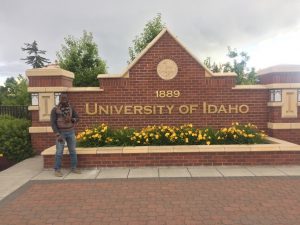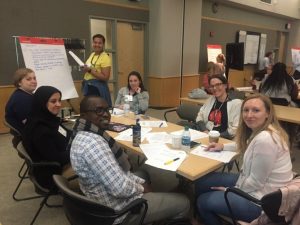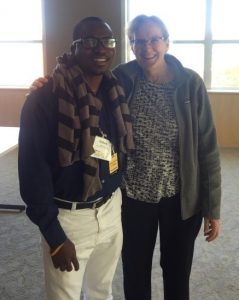Member blog: CONNECTED T19-funded ‘Biology of Vector-Borne Diseases’ course
This blog has been specially written for the CONNECTED website by Oladapo Folarin, one of our network members who successfully applied for CONNECTED ‘T19’ funding to attend this training opportunity
A course organised by The University of Idaho Center for Health in the Human Ecosystem (CHHE), Moscow, Idaho, USA, 23-28 June 2019

Oladapo at one of the entrances of the University of Idaho
It was good news for me when I got a mail from the Center for Health in the Human Ecosystem (CHHE) of the University of Idaho in December 2018, that I had been offered a registration fee waiver to attend the Biology of Vector-Borne Diseases course at the University of Idaho, Moscow, USA.
This prompted me to apply for a T19 funding offered by CONNECTED network to cover for my return ticket, and I had yet another “good news” when I received a mail that my funding application was approved; not to forget that I got to know about the course through one of the regular monthly newsletters sent by CONNECTED.
Summer in Moscow was a bit cold compared to other parts of the US with warmer weather at that period, and totally different from the tropical weather in Nigeria. The University of Idaho is a land grant and primary research university, and worthy to note is the fact that Idaho, which is one of the states in the US, is an agriculture hub with over 30% of the potato in the US being produced there.
The course was designed to accelerate interdisciplinary learning and discovery by focusing on vector-borne diseases of plants, animals and humans, to enable researchers look at these diseases holistically. As a plant virologist, it was an opportunity for me to garner more knowledge on vector-borne diseases and it also broadened my knowledge on some animal and human vector-borne diseases which I had limited insight of prior to the course.
The course involved lectures, discussions, case studies and hands on activities.

One of the case study sessions
The course outline included:
- Introduction to vector-borne diseases cycle
- Analytics, tools and models
- What makes a vector a vector
- Diagnostics
- Control
The classes were designed to be highly interactive with good communication between the participants and instructors. The instructors who had been duly selected were wonderful, with the likes of Shirley Luckhart, Cassandra Olds, Robert Gilbertson, Sanford Eigenbrode and many others.
Participants were drawn from different parts of the world as well as from different states within the US, so also were the instructors; and this allowed for knowledge sharing on different topics as it affects different parts of the world.
I made friends with young researchers from Canada, Uganda, France, Ghana, Russia, Brazil, Madagascar, Kansas, California, Colorado, Georgia…and the list continues. For me, this has opened more doors for collaborations in the future.
Two major highlights of the course were:
- the Analytics, tools and models class where we had a polymorphic game hands-on exercise, which involved an interactive interface to model vector-borne pathogen transmission and systems evolution, and
- the visit to the William F. Barr Entomological Museum at the University of Idaho, led by Luc LeBlanc, the Curator of the museum and a passionate Entomologist, who had worked on plant protection-related projects in Africa for seven years (and interestingly sings very well songs of one of Nigeria’s music legends –Fela), and other parts of the world.

Oladapo with Kathy DeRiemerPhD
I want to recognize the efforts of Kathy DeRiemer (Program Manager CHHE), who was the correspondence between participants and the organizing team before and during the course at the University of Idaho; an elderly woman but young at heart.
This training has equipped me with more knowledge that will be useful in my ongoing graduate research on rice viruses, as well as carrying out diagnostic test in the molecular laboratory of the National Agricultural Seeds Council, Nigeria, where I work. I will also share the knowledge I have learnt with my colleagues who work on the field as Seed Certification Officers and those working in the lab; to undergraduate students whose projects I supervise; and at different forums where I have the opportunity to talk on vector-borne diseases.
I will always be grateful to the CONNECTED network and CHHE for this opportunity, and will continue to spread the CONNECTED news for all African vector-borne diseases enthusiast to join.
More training opportunities like this will help in mitigating the adverse effect these diseases have on crops in Africa, through improved research and effective eradication/control measures, thereby ensuring food security.
To find out more about CONNECTED ‘T19’ training funding, and to apply, use this link
Oladapo Folarin is a CONNECTED network member who works as an Agric Officer at The National Agricultural Seeds Council, Abuja, Nigeria
